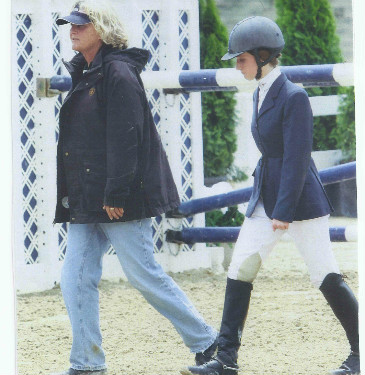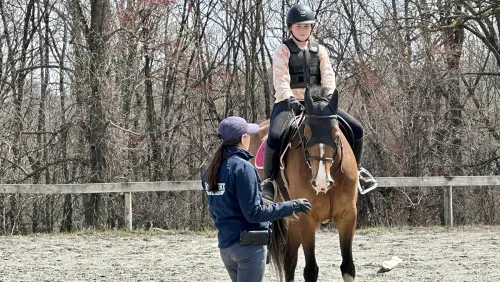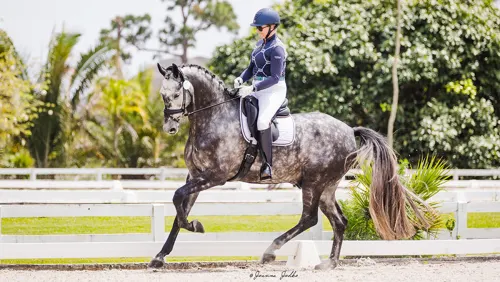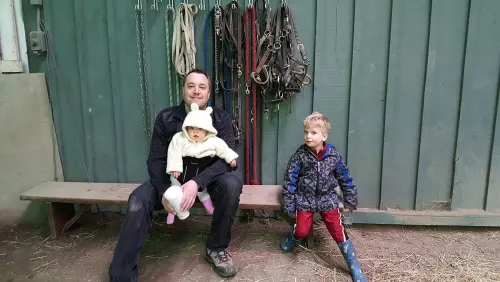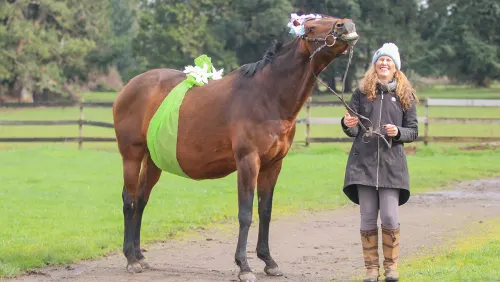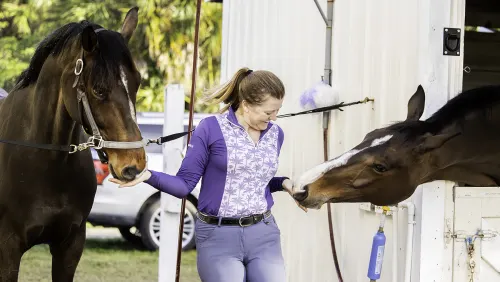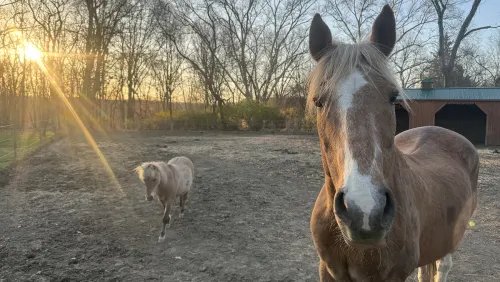So, I’ve recently started teaching lessons. I identify more as a student than as a teacher, so stepping into the role of instructor has been a peculiar and meandering process for me. I’ve avoided teaching in the past, not because I dislike it or lack the skill, but because to be a great instructor you need to be friendly and encouraging and have a way with words. By comparison, I am snarky and blunt and often in the heat of the moment just start yelling words and unintelligible phrases at students.
“Legs! Hands! Now both those together! Legs! Activate the hind part! Shoulders, now just move the thingy, uh, shoulders! The horse’s shoulders, not yours!”
I long ago decided my forte would be teaching horses, not people, mostly because it’s perfectly acceptable to smack a horse who is out of line, but do the same to a snippy student and it’s called assault. Also, educating people requires a measure of social grace I never managed to achieve.
My stepsister, Robin Young, who is also a trainer at Everbold, usually handles lessons. She’s welcoming, socially graceful, knowledgeable, experienced, in short everything a wonderful teacher should be. Plus she smiles a lot, which people seem to like. Robin and her imperishable grin have left me free over the years to lurk about the barn, talking only to the horses, making contact with students only when I disrupted their lessons with an unruly youngster or frisky jumper.
In the past, the most typical form of communication Everbold students have heard from me has been a cautionary “Heads Up!” as I’d go careening by on a young horse with a sudden and serious urge for anarchy. But Robin is gone for the season at WEF and she left me in charge with several students who, like me, didn’t make the long trip south to the land of glut and glory. Those poor left-behind souls; they have no idea what they’ve signed up for, for they shall be my guinea pigs.
Being an excellent rider and horsewoman doesn’t automatically guarantee I’ll be an excellent teacher. Teaching is a skill that must be practiced and studied. At this point, I have to credit my college education for teaching me how to teach. I was a “Recreation and Outdoor Education” minor in college, a minor which simultaneously concerned and amused my family (my dad’s favorite quip was that I could apply to be the next “Smokey the Bear”, but I think he was genuinely afraid I’d run off the farm to become a Park Ranger).
Jokes aside, most of my ROE classes revolved around teaching and guiding. I took semester-long classes entirely dedicated to the different learning and guiding styles and was given many opportunities to stand up in front of people and teach a skill or lead an exercise. ROE curriculum dictated most of the exercises I led related to communal drum circles or the quasi-mystical circle of sharing. But no matter, I am SO in touch with my feelings, man.
ADVERTISEMENT
Thanks to my college education, when I opened my mouth to teach my first lesson, I found it came surprisingly easy to me. Thank goodness for college, because prior to attending a higher learning institution, I hadn’t been exposed to a lot of professional instruction.
See, I didn’t take lessons regularly as a junior. We couldn’t afford it and even if we could, I couldn’t behave well enough for a trainer to tolerate me for long. That is, until Nancy Whitehead summoned me to her program and set me on my current path. Oh Captain! My Captain! (That is a different story for a different day.)
I learned a lot by trial and error, by watching others, by just trying to do stuff until it felt right. This system, coupled with occasional lessons from Nancy and other top professionals, actually worked pretty well for me. I took a few wrong turns along the way, sure, but growing up without someone constantly barking directions at me made me a very strategic thinker and gave me excellent instincts and an uncanny feel for the horse. Because of the manner of my equestrian upbringing, I don’t believe anyone can become a great rider and horseman by simply following directions. To be a great rider, you not only have to consistently do the correct things in the saddle but you also have to know precisely why they’re correct.
For instance, a good rider will know how to ride a beautiful counter canter, but a great rider will be able to ride a beautiful counter canter and be able to tell you why the counter canter is an essential exercise for the strength, balance, and obedience of his or her horse. So here’s the thing: I don’t give too many directions during my lessons. I pose questions; questions in the form of flatwork, gymnastics, and coursework which will force my students to find their own answers and their own connections. Oh, and I often don’t tell them what questions I’m asking with the exercises assigned. Good luck, kids.
I’m teaching pretty regularly now, and so far I haven’t assaulted anyone (an accomplishment for me) or made anyone cry (a goal for me). A few students have even said that they particularly enjoy my lessons and get a lot out of them, which I attribute to my diligent effort to speak only in logical complete sentences rather than frantic word clusters.
I’m sure I’ll keep learning and changing my methods as I grow as an instructor, but so far my guinea pigs (I mean students) have been constantly raising the bar in their riding, so I’m going to let their progress guide me in my methods. I do usually give one direction at the beginning of every lesson though: Don’t listen to me, listen to your horse.
Rebecca Young works for Everbold Farm in Kirkland, Ill. She rides, trains, shows and breeds primarily jumpers but does not discriminate against the occasional hunter. When not on horseback, Rebecca takes great joy in hiking, skiing, mountaineering,

